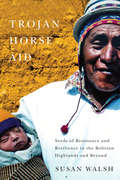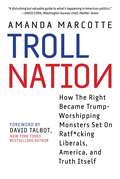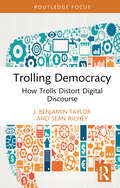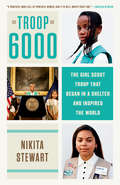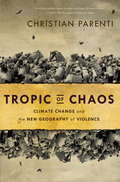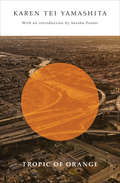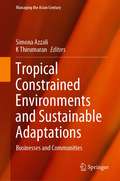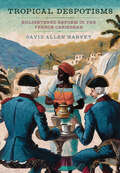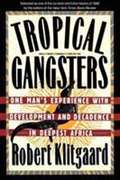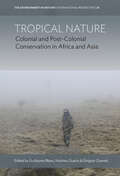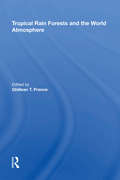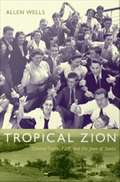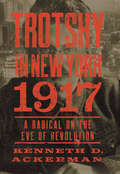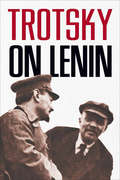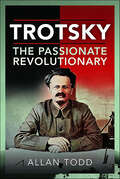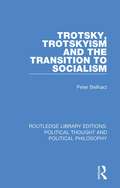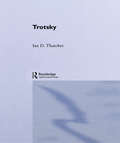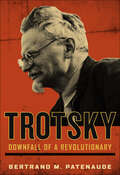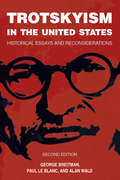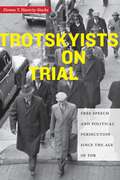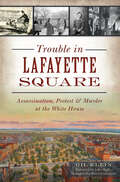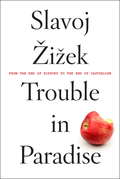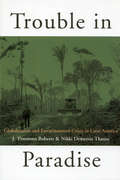- Table View
- List View
Trojan-Horse Aid
by Susan WalshIn a compelling first-hand account of development assistance gone awry, Susan Walsh recounts how national, international, and multilateral organizations failed the Jalq'a people in the Bolivian Andes during the early millennium. Intent on assisting potato farmers, development organizations pushed for changes that ultimately served their own interests, paradoxically undermining local resilience and pushing farmers off their lands. Trojan-Horse Aid challenges the idea of Western capacity-building, particularly the notion that introduced technologies related to food production are essential ingredients for sustainable livelihoods among farmers. Walsh argues that the well-intentioned organizations working in Jalq'a communities paid insufficient attention to longstanding knowledge that has supported human survival in regions where the natural world has the upper hand. Walsh goes beyond a critical review of misguided aid to offer reflections on the relationship between indigenous knowledge and resilience theory, the hopeful future of development assistance, and the contradictions in her own hybrid role as researcher and development-practitioner. In light of growing global concern over the worsening food crisis and interconnected climate extremes, Trojan-Horse Aid offers an important critique of development practices that undermine peasant strategies as well as suggestions for more effective approaches for the future.
Trojan-Horse Aid: Seeds of Resistance and Resilience in the Bolivian Highlands and Beyond
by Susan WalshIn a compelling first-hand account of development assistance gone awry, Susan Walsh recounts how national, international, and multilateral organizations failed the Jalq'a people in the Bolivian Andes during the early millennium. Intent on assisting potato farmers, development organizations pushed for changes that ultimately served their own interests, paradoxically undermining local resilience and pushing farmers off their lands. Trojan-Horse Aid challenges the idea of Western capacity-building, particularly the notion that introduced technologies related to food production are essential ingredients for sustainable livelihoods among farmers. Walsh argues that the well-intentioned organizations working in Jalq'a communities paid insufficient attention to longstanding knowledge that has supported human survival in regions where the natural world has the upper hand. Walsh goes beyond a critical review of misguided aid to offer reflections on the relationship between indigenous knowledge and resilience theory, the hopeful future of development assistance, and the contradictions in her own hybrid role as researcher and development-practitioner. In light of growing global concern over the worsening food crisis and interconnected climate extremes, Trojan-Horse Aid offers an important critique of development practices that undermine peasant strategies as well as suggestions for more effective approaches for the future.
Troll Nation: How The Right Became Trump-Worshipping Monsters Set On Rat-F*cking Liberals, America, and Truth Itself
by Amanda Marcotte“Amanda Marcotte drains the swamp and reveals a Republican Party hijacked by grifters and frauds.” ?David DaleyThe election of Donald Trump in 2016, like most of his campaign, came as a shock to many Americans. How could a man so lacking in capacity, so void of any intellectual heft, become the president of the United States? How did Trump, a man with no detectable personal qualities outside of resentment and the will to dominate, appeal to millions of Americans and win the highest office in the land? The American right has spent decades turning away from reasoned discourse toward a rhetoric of pure resentment—it’s this shift that laid the groundwork for Trump’s ascendency. In Troll Nation, journalist Amanda Marcotte outlines how Trump was the inevitable result of American conservatism’s degradation into an ideology of blind resentment. For years now, the purpose of right wing media, particularly Fox News, has not been to argue for traditional conservative ideals, such as small government or even family values, so much as to stoke bitterness and paranoia in its audience. Traditionalist white people have lost control over the culture, and they know it, and the only option they feel they have left is to rage at a broad swath of supposed enemies ? journalists, activists, feminists, city dwellers, college professors ? that they blame for stealing “their” country from them. Conservative pundits, politicians, and activists have abandoned any hope of winning the argument through reasoned discourse, and instead have adopted a series of bad faith claims, conspiracy theories, and culture war hysterics. Decades of these antics created a conservative voting base that was ready to elect a mindless bully like Donald Trump.
Trolling Democracy: How Trolls Distort Digital Discourse (Routledge Research in Political Communication)
by J. Benjamin Taylor Sean RicheyThe Internet is a hub for gathering political information and accounts for significant political activity; however, social interactions online are often disrupted by trolling. As digital democracy continues to evolve, understanding trolling is crucial for developing strategies to foster a healthier online environment conducive to democratic engagement. Understanding the objective of posting deceitful, inflammatory content is crucial. Trolling Democracy offers both academic and practical insights into one of the most pressing challenges of the digital age. By leveraging theoretical insights, empirical evidence from new surveys, and innovative experiments, J. Benjamin Taylor and Sean Richey offer a comprehensive understanding of trolling’s effect on the public sphere and its implications for democratic processes. Furthermore, they address the broader societal concerns raised by the proliferation of trolling, including the spread of misinformation, the erosion of trust in online platforms, and the exacerbation of political polarization. Enhancing our knowledge of trolling by bridging gaps in previous research and proposing new avenues for future study, Taylor and Richey equip us with the tools to counteract its negative effects more effectively.
Troop 6000: The Girl Scout Troop That Began in a Shelter and Inspired the World
by Nikita StewartThe inspiring true story of the first Girl Scout troop founded for and by girls living in a shelter in Queens, New York, and the amazing, nationwide response that it sparked. <P><P>Giselle Burgess was a young mother of five trying to provide for her family. Though she had a full-time job, the demands of ever-increasing rent and mounting bills forced her to fall behind, and eviction soon followed. Giselle and her kids were thrown into New York City’s overburdened shelter system, which housed nearly 60,000 people each day. They soon found themselves living at a Sleep Inn in Queens, provided by the city as temporary shelter; for nearly a year, all six lived in a single room with two beds and one bathroom. With curfews and lack of amenities, it felt more like a prison than a home, and Giselle, at the mercy of a broken system, grew fearful about her family’s future. She knew that her daughters and the other girls living at the shelter needed to be a part of something where they didn&’t feel the shame or stigma of being homeless, and could develop skills and a community they could be proud of. Giselle had worked for the Girl Scouts and had the idea to establish a troop in the shelter, and with the support of a group of dedicated parents, advocates, and remarkable girls, Troop 6000 was born. <P><P>New York Times journalist Nikita Stewart settled in with Troop 6000 for more than a year, at the peak of New York City’s homelessness crisis in 2017, getting to know the girls and their families and witnessing both their triumphs and challenges. In Troop 6000, readers will feel the highs and lows as some families make it out of the shelter while others falter, and girls grow up with the stress and insecurity of not knowing what each day will bring and not having a place to call home, living for the times when they can put on their Girl Scout uniforms and come together. The result is a powerful, inspiring story about overcoming the odds in the most unlikely of places. <P><P>Stewart shows how shared experiences of poverty and hardship sparked the political will needed to create the troop that would expand from one shelter to fifteen in New York City, and ultimately inspired the creation of similar troops across the country. Woven throughout the book is the history of the Girl Scouts, an organization that has always adapted to fit the times, supporting girls from all walks of life. <P><P>Troop 6000 is both the intimate story of one group of girls who find pride and community with one another, and the larger story of how, when we come together, we can find support and commonality and experience joy and success, no matter how challenging life may be.
Tropic of Chaos: Climate Changes and the New Geography of Violence
by Christian ParentiFrom Africa to Asia and Latin America, the era of climate wars has begun. Extreme weather is breeding banditry, humanitarian crisis, and state failure. In Tropic of Chaos, investigative journalist Christian Parenti travels along the front lines of this gathering catastrophe--the belt of economically and politically battered postcolonial nations and war zones girding the planet's midlatitudes. Here he finds failed states amid climatic disasters. But he also reveals the unsettling presence of Western military forces and explains how they see an opportunity in the crisis to prepare for open-ended global counterinsurgency. Parenti argues that this incipient "climate fascism"--a political hardening of wealthy states-- is bound to fail. The struggling states of the developing world cannot be allowed to collapse, as they will take other nations down as well. Instead, we must work to meet the challenge of climate-driven violence with a very different set of sustainable economic and development policies.
Tropic of Orange
by Karen Tei Yamashita Sesshu Foster“David Foster Wallace meets Gabriel Garcia Marquez” in this novel set in a dystopian Los Angeles from a National Book Award finalist (Publishers Weekly). Irreverently juggling magical realism, film noir, hip hop, and chicanismo, Tropic of Orange takes place in a Los Angeles where the homeless, gangsters, infant organ entrepreneurs, and Hollywood collide on a stretch of the Harbor Freeway. Hemmed in by wildfires, it’s a symphony conducted from an overpass, grandiose, comic, and as diverse as the city itself—from an author who has received the California Book Award and the Association for Asian American Studies Book Award, among other literary honors. “Fiercely satirical . . . Yamashita presents [an] intricate plot with mordant wit.” —The New York Times Book Review “A stunner . . . An exquisite mystery novel. But this is a novel of dystopia and apocalypse; the mystery concerns the tragic flaws of human nature.” —Library Journal (starred review) “Brilliant . . . An ingenious interpretation of social woes.” —Booklist (starred review)
Tropical Constrained Environments and Sustainable Adaptations: Businesses and Communities (Managing the Asian Century)
by Simona Azzali K ThirumaranThis book investigates resource-constrained environments in the tropics and subtropics where people’s lives and businesses are affected, and adaptations occur periodically. Constrained environments are unique territories characterised by challenging circumstances, limited land and natural resources. They can be places with a small municipal boundary or cities in which parts around them may be consumed by ocean, bay or mountains. Those places face hard physical boundaries like coastlines and mountains, which in addition to policy decisions that may limit height or density, can also serve to limit capacity for expansion. Successful communities and businesses tend to survive in a changing environment given their strong intuitive and forward-looking adaptations.This book delves into the role of urban planning and design in the promotion of business and adaptations of people and communities. Additionally, the focus takes into account impact analysis and the effects of an expanding populations, including growing migrant flows, and business needs on the built environment of land-constrained territories
Tropical Despotisms: Enlightened Reform in the French Caribbean
by David Allen HarveyTropical Despotisms reveals the alarm that spread among France's Caribbean possessions during the period between the Seven Years' War and the Revolution and the determination to cultivate a new patriotic community rooted in the Enlightenment principles of honor and civic virtue. Following France's humiliating defeat at the hands of the British, a loose coalition of frustrated and enlightened reformers hoped to promote imperial regeneration in order to restore France's wounded national pride, stabilize and strengthen the Antillean colonies, and bind the colonies more closely to the metropole.David Allen Harvey describes the historical relationship between capitalism and slavery in the making of the modern world economy and moves beyond simplistic arguments by discussing the contingent and evolving dynamic between the two. As a result, he reveals how capitalism and slavery developed in tandem in the eighteenth-century Caribbean but explains that reformers sought to enact a gradual transition to a free wage labor regime more in keeping with capitalism's ideal of free and voluntary contractual relationships between formally equal parties.Tropical Despotisms provides a new perspective on the social and demographic structure in the French Antilles and the wider French Atlantic world. Harvey uncovers not only the deep and critical debates around the issues of slavery and race but also the efforts by enlightened reformers as they proposed rethinking the political and economic structures by which the empire had been ruled, rationalizing governing institutions, and liberalizing trade.
Tropical Gangsters: One Man's Experience With Development And Decadence In Deepest Africa
by Robert KlitgaardSelected as one of the six best nonfiction books of 1990 by the editors f the New York Times Book Review, this is a compelling and entertaining account of the author’s two-and-a-half year adventure in Equatorial Guinea, and his efforts to get this small bankrupt African nation on the path of structural development.
Tropical Nature: Colonial and Post-Colonial Conservation in Africa and Asia (Environment in History: International Perspectives)
by Guillaume Blanc, Mathieu Guérin and Grégory QuenetAcross Africa and South-East Asia, the impulse to protect nature often dovetails with the domination of local people. From mass displacement to severe restrictions on land use and daily acts of violence, conservation work risks reproducing Eurocentric modes of colonialism and worsening the effects of the climate crisis. In this insightful and wide-ranging study of the colonial history of conservation, Tropical Nature seeks to provide a much-needed history of the Global South from its own perspective. Comparing case studies ranging from Ali Bongo’s Gabon, to the postcolonial African itinerary of the agronomist Arthur Bunting, this volume advances a “small-scale global history” that deciphers the relations binding human societies to the non-human world.
Tropical Party: Book 20 (Secret Princesses #20)
by Rosie BanksCharlotte and Mia need to help Kala, a hawaiian girl who is organising a tropical party. Can the girls learn the hula, defeat Princess Poison, grant Kala's wish AND save the mermaids? A tropical storm is brewing ...
Tropical Rain Forests And The World Atmosphere
by Ghillean T PranceThis book, the result of a AAAS symposium organized to explore the ramifications of tropical deforestation, emphasizes the relationship of biosphere to troposphere, aiming to set tropical forest ecology in the context of the global ecosystem.
Tropical Zion: General Trujillo, FDR, and the Jews of Sosúa
by Allen WellsSeven hundred and fifty Jewish refugees fled Nazi Germany and founded the agricultural settlement of Sosa in the Dominican Republic, then ruled by one of Latin America's most repressive dictators, General Rafael Trujillo. In Tropical Zion, Allen Wells, a distinguished historian and the son of a Sosa settler, tells the compelling story of General Trujillo, Franklin Delano Roosevelt, and those fortunate pioneers who founded a successful employee-owned dairy cooperative on the north shore of the island. Why did a dictator admit these desperate refugees when so few nations would accept those fleeing fascism? Eager to mollify international critics after his army had massacred 15,000 unarmed Haitians, Trujillo sent representatives to vian, France, in July, 1938 for a conference on refugees from Nazism. Proposed by FDR to deflect criticism from his administration's restrictive immigration policies, the vian Conference proved an abject failure. The Dominican Republic was the only nation that agreed to open its doors. Obsessed with stemming the tide of Haitian migration across his nation's border, the opportunistic Trujillo sought to "whiten" the Dominican populace, welcoming Jewish refugees who were themselves subject to racist scorn in Europe. The Roosevelt administration sanctioned the Sosa colony. Since the United States did not accept Jewish refugees in significant numbers, it encouraged Latin America to do so. That prodding, paired with FDR's overriding preoccupation with fighting fascism, strengthened U. S. relations with Latin American dictatorships for decades to come. Meanwhile, as Jewish organizations worked to get Jews out of Europe, discussions about the fate of worldwide Jewry exposed fault lines between Zionists and Non-Zionists. Throughout his discussion of these broad dynamics, Wells weaves vivid narratives about the founding of Sosa, the original settlers and their families, and the life of the unconventional beach-front colony.
Trotsky in New York, 1917: From Times Square to Petrograd
by Kenneth D. AckermanLev Davidovich Trotsky burst onto the world stage in November 1917 as co-leader of a Marxist Revolution seizing power in Russia. It made him one of the most recognized personalities of the Twentieth Century, a global icon of radical change. Yet just months earlier, this same Lev Trotsky was a nobody, a refugee expelled from Europe, writing obscure pamphlets and speeches, barely noticed outside a small circle of fellow travelers. Where had he come from to topple Russia and change the world? Where else? New York City. Between January and March 1917, Trotsky found refuge in the United States. America had kept itself out of the European Great War, leaving New York the freest city on earth. During his time there-just over ten weeks-Trotsky immersed himself in the local scene. He settled his family in the Bronx, edited a radical left wing tabloid in Greenwich Village, sampled the lifestyle, and plunged headlong into local politics. His clashes with leading New York socialists over the question of US entry into World War I would reshape the American left for the next fifty years.
Trotsky on Lenin
by Leon Trotsky&“Fascinating . . . full of insight and a perceptive portrait of Lenin&’s single-mindedness and his relentless, all-consuming drive towards revolution in Russia.&” —The Guardian Combining Young Lenin and On Lenin in one volume, this is a fascinating political biography by Lenin&’s fellow revolutionary, Leon Trotsky. Trotsky on Lenin brings together two long-out-of-print works in a single volume for the first time, providing an intimate and illuminating portrait of the Bolshevik leader by another of the twentieth century&’s greatest revolutionaries. Written shortly after its subject&’s death, On Lenin covers the period of revolutionary struggle leading up to 1917 as well as the early years of Bolshevik power. We see a man totally committed to the revolutionary cause, whose legacy was later corrupted under the Soviet Union&’s Stalinist degeneration. Young Lenin, meanwhile, describes his early years and conversion to Marxism, dispelling many of the myths later created by Soviet hagiography in the process. This is the essential guide for anyone wanting to understand Lenin as a thinker, active revolutionary, and personality.
Trotsky, The Passionate Revolutionary
by Allan ToddAlthough Trotsky was dramatically assassinated just over eighty years ago, he remains a controversial figure. He has had many biographers over the decades - ranging from the overly-sympathetic, to the extremely-hostile. Robert Service, his most recent biographer, expressed the hope that his book would ‘finish off’ Trotsky - a job he believed the ice-axe had failed to do in 1940! This biography, as expected, deals with those aspects for which Trotsky is noted: his passionate and fiery oratory which captivated and inspired huge crowds; organising the Bolshevik Revolution of November 1917; masterminding the creation of the Red Army and ensuring its victory during the Civil War; becoming the most determined opponent of Stalin’s creation of a monolithic party and state; being a Marxist theoretician of socialist revolution and combatting fascism; and, of course, being the originator of the very specific brand of revolutionary socialism that, as early as 1906, became known as Trotskyism. However, this biography also explores other aspects of Trotsky’s life which are not so well-known. In particular, from a very early age, his love of writing: the world of books and publishing became his first passion; it remained his first love and, if revolutionary politics had not taken over, his life would have been a very literary one. Immediately after the November Revolution, he hoped to return to his literary work, believing his main practical work as a revolutionary was over. His writings on art and literature, when compared to the stultifying strictures of the ‘Socialist Realism’ associated with Stalinism, are remarkably sympathetic and open; while he also wrote many perceptive articles as a war correspondent, covering both the Balkan Wars and the early stages of the First World War. Other aspects covered by this biography concern his family life, and his relationships with his children. Also explored is his love-life - while it is known he had a brief affair with the Mexican artist, Frida Kahlo, there are also suggestions he may have had other affairs. Whatever the truth of such allegations, he certainly maintained a passionate relationship with his long-term companion, Natalya Sedova; and readers should be aware that one proof of that, provided towards the end of this book, contains very explicit language.
Trotsky, Trotskyism and the Transition to Socialism (Routledge Library Editions: Political Thought and Political Philosophy #4)
by Peter BeilharzFirst published in 1987. Trotskyists have long dominated the revolutionary tradition on the Western left. Written from a critical socialist standpoint, this book provides an analysis of Trotskyism and argues that Trotskyism is increasingly irrelevant as a means of achieving socialism. It argues that, as the realisation grows that the revolutionary tradition and the authoritarianism which necessarily result from it are wrong, the importance of the problem of the transition to socialism increases. It argues that on this point Trotskyism is weak; that Trotskyism's proposals for socialist transition are largely rhetorical; and that its democratic impulse is weak. It supports this argument by showing that Trotsky’s philosophy of history, implicit in his writings, which the author characterises as evolutionary and necessitarian, coupled with a failure to grasp the moral basis of the socialist case, has a disabling effect on Trotsky's account of the transition to socialism and on his explanation of Stalinism. Moreover, it argues that Trotsky's intellectual and political heirs have been unable to escape from the contradictions inherent in his thought.
Trotsky: August 1914 - February 1917 (Routledge Historical Biographies)
by Ian D. ThatcherThis new biography provides a full account of Leon Trotsky's political life, based upon a wealth of primary sources, including previously unpublished material. Ian D. Thatcher paints a new picture of Trotsky's standing in Russian and world history. Key myths about Trotsky's heroic work as a revolutionary, especially in Russia's first revolution of 1905 and the Russian Civil War, are thrown into question. Although Trotsky had a limited understanding of crucial contemporary events such as Hitler's rise to power, he was an important thinker and politician, not least as a trenchant critic of Stalin's version of communism.
Trotsky: Downfall of a Revolutionary
by Bertrand M. PatenaudeA dramatic chronicle of revolutionary, politician, and political theorist Leon Trotsky’s final years in exile in Mexico.Few political figures of the twentieth century have aroused as much passion, controversy, and curiosity as Leon Trotsky. His role in history—his epic rise and fall, his fiery persona, his violent end in Mexico in August 1940—holds a fascination that transcends the history of the Russian Revolution. Bertrand M. Patenaude masterfully interweaves the story of Trotsky’s final years with flashbacks to pivotal episodes in his career as a young Marxist, revolutionary hero, Red Army chief, Bolshevik leader, outcast from Stalin’s USSR, and ultimately heretic of the Kremlin, targeted for assassination by its secret police. Gripping, tragic, and based on extensive firsthand research, Trotsky brilliantly illuminates the fateful and dramatic life of one of history’s most captivating and important figures.Praise for Trotsky“Excellent, exciting. . . . Trotsky charts with novelistic flair and in archival detail, the progress of the plot that culminated in Trotsky being killed with an ice axe in 1940.” —Simon Sebag Montefiore, The Sunday Times Telegraph (London)“This book deepens and enhances the sense of tragedy that always attends contemplation of “the Old Man” and his last struggle.” —Christopher Hitchens“Betrand Patenaude tells a masterly story of a brilliant, cornered man and, along the way, of a misguided century.” —The Wall Street Journal“A captivating account. . . . Patenaude paints a vivid portrait of Trotsky, a flamboyant, Westernized intellectual. . . . This is a dramatic, event-filled portrait of a turbulent, half-forgotten era.” —Publishers Weekly (starred review)
Trotskyism in the United States: Historical Essays and Reconsiderations
by George Breitman Paul Le Blanc Alan WaldIn the new edition of this definitive work on the history of the revolutionary socialist current in the United States that came to be identified as "American Trotskyism," Paul Le Blanc offers fresh reflections on this history for scholars and activists in the twenty-first century. Includes a preface written especially for the new edition of this distinctive work.
Trotskyists on Trial: Free Speech and Political Persecution Since the Age of FDR (Culture, Labor, History #1)
by Donna T Haverty-StackePassed in June 1940, the Smith Act was a peacetime anti-sedition law that marked a dramatic shift in the legal definition of free speech protection in America by criminalizing the advocacy of disloyalty to the government by force. It also criminalized the acts of printing, publishing, or distributing anything advocating such sedition and made it illegal to organize or belong to any association that did the same. It was first brought to trial in July 1941, when a federal grand jury in Minneapolis indicted twenty-nine Socialist Workers Party members, fifteen of whom also belonged to the militant Teamsters Local 544. Eighteen of the defendants were convicted of conspiring to overthrow the government. Examining the social, political, and legal history of the first Smith Act case, this book focuses on the tension between the nation’s cherished principle of free political expression and the demands of national security on the eve of America’s entry into World War II. Based on newly declassified government documents and recently opened archival sources, Trotskyists on Trial explores the implications of the case for organized labor and civil liberties in wartime and postwar America. The central issue of how Americans have tolerated or suppressed dissent during moments of national crisis is not only important to our understanding of the past, but also remains a pressing concern in the post-9/11 world. This volume traces some of the implications of the compromise between rights and security that was made in the mid-twentieth century, offering historical context for some of the consequences of similar bargains struck today.
Trouble in Lafayette Square: Assassination, Protest & Murder at the White House (Landmarks)
by Gil KleinA unique history of the park across from the White House, and the many tumultuous events that have happened there—includes photos and illustrations. Lafayette Square, near the White House, has been in the spotlight during recent protests—but many are unaware that this Washington, DC, spot is surrounded by landmarks and steeped in a fascinating history of rebellion. A congressman shot and killed the son of Francis Scott Key in broad daylight on the square and got away with it. On the night Lincoln was assassinated, a co-conspirator forced his way into Secretary of State William Seward&’s house and nearly killed him. The women&’s suffrage movement created the tradition of White House protest that goes on to this day, and in 1950, Puerto Rican nationalists tried to force their way into Blair House to assassinate President Truman, who was living there. In this book, prominent Washington journalist Gil Klein recounts these and other stories, bringing to life the rich and sometimes bloody history of this seven-acre public gathering place.
Trouble in Paradise
by Slavoj ZizekIn Trouble in Paradise, Slavoj i ek, one of our most famous, most combative philosophers, explains how we can find a way out of the crisis of capitalism. There is obviously trouble in the global capitalist paradise. But why do we find it so difficult to imagine a way out of the crisis we're in? It is as if the trouble feeds on itself: the march of capitalism has become inexorable, the only game in town. Setting out to diagnose the condition of global capitalism, the ideological constraints we are faced with in our daily lives, and the bleak future promised by this system, Slavoj i ek explores the possibilities--and the traps--of new emancipatory struggles. Drawing insights from phenomena as diverse as "Gangnam Style" to Marx, The Dark Knight to Thatcher, Trouble in Paradise is an incisive dissection of the world we inhabit, and the new order to come.From the Hardcover edition.
Trouble in Paradise: Globalization and Environmental Crises in Latin America
by J Roberts TimmonsEnvironmental degradation in Latin America has become one of the most pressing issues on the international agenda. The volume began to crescendo when space shuttle astronauts photographed five thousand fires on a single night in the Brazilian Amazon state of Rondonia in 1985, and grew shrill when rubbertapper Chico Mendes was shot in 1988 trying to
